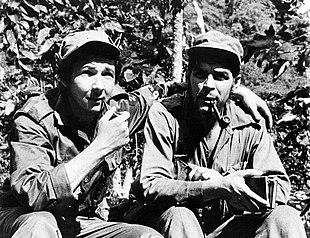
Back نظرية فوكو Arabic Fokizm Azerbaijani Фокизъм Bulgarian Foquisme Catalan Fokustheorie German Foquismo Spanish نظریه فوکو Persian Foco French Foquismo Galician Foco ID

A guerrilla foco is a small cadre of revolutionaries operating in a nation's countryside. This guerrilla organization was popularized by Che Guevara in his book Guerrilla Warfare, which was based on his experiences in the Cuban Revolution. Guevara would go on to argue that a foco was politically necessary for the success of a socialist revolution. Originally Guevara theorized that a foco was only useful in overthrowing personalistic military dictatorships and not liberal democratic capitalism where a peaceful overthrow was believed possible. Years later Guevara would revise his thesis and argue all nations in Latin America, including liberal democracies, could be overthrown by a guerrilla foco. Eventually the foco thesis would be that political conditions would not even need to be ripe for revolutions to be successful, since the sheer existence of a guerrilla foco would create ripe conditions by itself. Guevara's theory of foco, known as foquismo (Spanish: [foˈkizmo]), was self-described as the application of Marxism-Leninism to Latin American conditions, and would later be further popularized by author Régis Debray. The proposed necessity of a guerrilla foco proved influential in Latin America, but was also heavily criticized by other socialists.[1][2]
This theory of foco proved heavily influential among armed militants around the world. Che Guevara's success in the Cuban Revolution was seen as proof of his thesis and thus popularized foco theory. Some of the famous militant groups to adopt foco theory included the Red Army Faction, Irish Republican Army, and Weather Underground. The theory became especially popular in the New Left for its breaking with the strategy of incremental political change supported by the Soviet Union, while also encouraging the possibility of immediate revolution.[3]
- ^ Guevara, Che (1997). Guerrilla Warfare. SR Books. pp. 9–17. ISBN 9780842026789.
- ^ Women and Revolution Global Expressions. Springer Netherlands. 1998. p. 286. ISBN 9780792351825.
- ^ Katsiaficas, George (1987). The Imagination of the New Left: A Global Analysis of 1968. South End Press. pp. 35–37. ISBN 9780896082274.